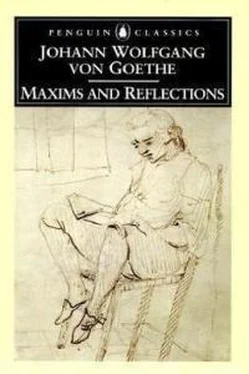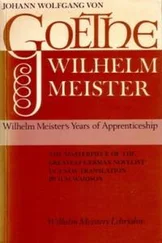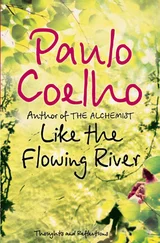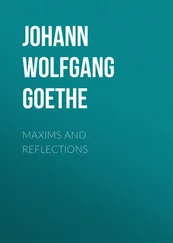Иоганн Гёте - Maxims and Reflections
Здесь есть возможность читать онлайн «Иоганн Гёте - Maxims and Reflections» весь текст электронной книги совершенно бесплатно (целиком полную версию без сокращений). В некоторых случаях можно слушать аудио, скачать через торрент в формате fb2 и присутствует краткое содержание. Год выпуска: 2015, Издательство: epubBooks Classics, Жанр: Публицистика, на английском языке. Описание произведения, (предисловие) а так же отзывы посетителей доступны на портале библиотеки ЛибКат.
- Название:Maxims and Reflections
- Автор:
- Издательство:epubBooks Classics
- Жанр:
- Год:2015
- ISBN:нет данных
- Рейтинг книги:5 / 5. Голосов: 1
-
Избранное:Добавить в избранное
- Отзывы:
-
Ваша оценка:
- 100
- 1
- 2
- 3
- 4
- 5
Maxims and Reflections: краткое содержание, описание и аннотация
Предлагаем к чтению аннотацию, описание, краткое содержание или предисловие (зависит от того, что написал сам автор книги «Maxims and Reflections»). Если вы не нашли необходимую информацию о книге — напишите в комментариях, мы постараемся отыскать её.
Maxims and Reflections — читать онлайн бесплатно полную книгу (весь текст) целиком
Ниже представлен текст книги, разбитый по страницам. Система сохранения места последней прочитанной страницы, позволяет с удобством читать онлайн бесплатно книгу «Maxims and Reflections», без необходимости каждый раз заново искать на чём Вы остановились. Поставьте закладку, и сможете в любой момент перейти на страницу, на которой закончили чтение.
Интервал:
Закладка:
In Goethe we pass, as over a bridge, from the eighteenth century to the nineteenth; but though he lived to see a third of the nineteenth century, he hardly belongs to it. Of its political characteristics he had few or none. He was no democrat. As the prophet of inward culture, he took the French Revolution for a disturbance, an interruption, and not a development in the progress of the world's history; and for all its horrors and the pernicious demoralisation of its leaders, he had the profoundest aversion. But afterwards he came to see that it had beneficial results; that a revolution is ultimately never the fault of the people, but of the injustice and incapacity of the government; and that where there is a real necessity for a great reform, the old leaven must be rooted out. [3] Gespräche mit Eckermann , III. 4 January, 1824.
But he knew the danger of such a process, and he indicates it here in an admirable saying: "Before the French Revolution it was all effort ; afterwards it all changed to demand "; and this may be supplemented by his opinion on the nature of revolutionary sentiments: "Men think they would be well–off if they were not ruled, and fail to perceive that they can rule neither themselves nor others." And if he, had thus no theoretical sympathy with democratic movements, he had little feeling for that other great political tendency of our time—nationality; convinced as he was that interest in the weal and woe of another people is always a mark of the highest culture. But apart from politics there is one characteristic of our own time in which he fully and especially shares, if only for the reason that he did much himself to produce it; and herein he has influenced us profoundly and is influencing us still. The nineteenth century has this advantage over every preceding age, that in it for the first time honest doubt, instead of distinguishing a few, has become a common virtue. Goethe is one of the surest and safest of those who have led the transition. "We praise the eighteenth century," he writes, "for concerning itself chiefly with analysis. The task remaining to the nineteenth is to discover the false syntheses which prevail, and to analyse their contents anew." Of the aim of analysis and the proper course of inquiry, no one has given a better account than Goethe in what he says, in the words I have quoted, about active scepticism; and in the sphere of morals and religion it will perhaps be found hereafter that he has contributed, in some degree at least, to the attainment of that "conditioned certainty," for which, as we hope, all our efforts are made.
In the maxims on Literature there is some excellent criticism on literary methods, and much that may well be taken to heart by certain writers of our own day. Goethe had little but rebuke for the whole of the romantic movement, which began in his old age. The German form of it he thought unnatural, and at best a conventional imitation of an earlier period; and the French form, of which Victor Hugo was then the rising star, he thought a perversion of naturalism, an exaggeration of it until it became insipid or merely revolting. To Byron alone he gave the tribute of the most ungrudging admiration: in the opposition between classicism and romanticism, he declined to take him for a follower of either, but as the complete representative of his own time. The maxim that "the classical is health, and the romantic, disease," may not altogether commend itself to us now; but with wonderful insight Goethe foresaw the direction in which the romantic movement would lead. "The romantic," he says here, "is already fallen into its own abysm. It is hard to imagine anything more degraded than the worst of the new productions." If he could have said this two generations ago, what would he have said now? How could he have spoken without contempt of those who make all that is common and unclean in itself a subject with which literature may properly be occupied? These are the writers who profess to be realists, under a completely mistaken notion of what realism means, as applied to art; and to them the chief realities seem to be just the very things that decent people keep out of sight. They forget that in literature, as in all art, the dominating realities are the highest Ideals. As an antidote to this poison of corruption Goethe pointed to the ancient world, and bid us study there the types of the loftiest manhood. "Bodies which rot while they are still alive and are edified by the detailed contemplation of their own decay; dead men who remain in the world for the ruin of others, and feed their death on the living—to this," he exclaimed, "have come our makers of literature. When the same thing happened in antiquity, it was only as a strange token of some rare disease; but with the moderns the disease has become endemic and epidemic." Akin to these pseudo–realists, and coming under the same ban, are some of our modern novel–writers who do, indeed, avoid the depth of degradation, but try to move the feelings by dwelling in a similar fashion on matters which are not, and never can be, fit subjects of literary treatment; such as painful deaths by horrible distempers, or the minute details of prolonged operations. It is poor skill that cannot find material enough in the moral sufferings of men and women, and is driven to seek effect in descriptions of disease and surgery. Surely in any literature worthy of the name these are topics which a richer imagination and a more prolific art would have found unnecessary, and better taste would have left undescribed.
To another class of writers—those who handle a pretty pen without having anything definite to present, or anything important to say, Goethe has also an applicable word. It is a class which is always increasing in number, and tends to increase in talent. We may admit that second– or third–rate work, especially in poetry, was never before done so well as it is done now; and still we may find some useful truth in a distinction which Goethe drew for the benefit of the minor poets and the minor prose–writers of his own age. "Productions are now possible," he said, "which, without being bad, have no value. They have no value, because they contain nothing; and they are not bad, because a general form of good workmanship is present to the author's mind." In one of the many neglected volumes of his miscellaneous writings Goethe has a series of admirable notes for a proposed work on Dilettantism ; and there the reader, if he is interested in Goethe's literary criticism, will find some instructive remarks in close connection with this aphorism, and also certain rules for discriminating between good and indifferent work which ought to receive the most attentive study. And the stylists who neglect plain language for a mosaic of curious phrase and overstrained epithet, may profitably remember that, as Goethe here says, "it is not language in itself which is correct or forcible or elegant, but the mind that is embodied in it."
"Translators," he tells us, "sing the praises of some half–veiled beauty and rouse an irresistible longing for the original." To them also he gives a piece of excellent advice: "The translator must proceed until he reaches the untranslatable." This is a counsel of exhortation as well as of warning. It bids the translator spare no effort, but tells him that at a certain point his efforts are of no avail. But none the less, Goethe might have added, the faithful translator must strive as if this hindrance to perfection did not exist; for it is thus only that he, or any one else, can do anything worth doing. On methods of translation much may be said, and it is sometimes urged, in a given case, that it is not literal or that it is too free. A distinguished writer has recently laid down that a translation should reproduce every word and phrase and sentence of the original as accurately as a delicate tracing reproduces the lines of a drawing. This is advice which may hold in the school–room, but, I venture to maintain, nowhere else. In so far as every language has a peculiar genius, a literal translation must necessarily be a bad one; and any faithful translation will of its nature be free. In other words, a translator will err if he slavishly adheres to mere expression; he must have complete liberty to give his author's meaning and style in the manner which he holds to be truest to the original; and so, in translating from a foreign tongue, it will be well for him to have some knowledge of his own. But he must guard against the abuse of his position: his liberty may become license, and his translation instead of being faithful may be phantastic. The translator's first and last duty is, then, to efface himself. His first duty is to stand entirely at the point of view of his author's thought; his last, to find the clearest and nearest expression in his own language both for that thought and for whatever is characteristic in the way of conveying it; neither adding anything of his own nor taking away anything from his author. The best translation is thus a re–embodiment of the author's spirit, a real metempsychosis. Nothing can be done without ideals, and this is the ideal at which the present translation aims. That it fails of its aim and has many defects, no one knows better than the translator himself; and he can only cherish the hope that where he falls short he is sometimes close to the confines of what cannot be translated.
Читать дальшеИнтервал:
Закладка:
Похожие книги на «Maxims and Reflections»
Представляем Вашему вниманию похожие книги на «Maxims and Reflections» списком для выбора. Мы отобрали схожую по названию и смыслу литературу в надежде предоставить читателям больше вариантов отыскать новые, интересные, ещё непрочитанные произведения.
Обсуждение, отзывы о книге «Maxims and Reflections» и просто собственные мнения читателей. Оставьте ваши комментарии, напишите, что Вы думаете о произведении, его смысле или главных героях. Укажите что конкретно понравилось, а что нет, и почему Вы так считаете.








![Иоганн Гёте - Итальянское путешествие [litres]](/books/398657/iogann-gete-italyanskoe-puteshestvie-litres-thumb.webp)



